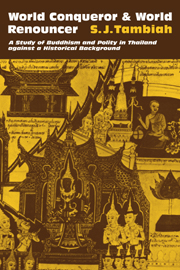 World Conqueror and World Renouncer
World Conqueror and World Renouncer Published online by Cambridge University Press: 10 November 2010
Our analysis of the myth of genesis contained in the Agganna Suttanta showed that it had a balanced structure with the king on the one side mediating between social disorder and the formation of the four vannas (orders), of society itself, and with the bhikkhu on the other side, drawn from all four vannas, transcending society, mediating between home and homelessness and entering the path that leads from lokiya, this world, to lokottara, the other world of liberation. He (i.e., the bhikkhu) therefore is chief of them all, the king, the khattiya, the brahmanas, the vessa, and the sudda.
Early Buddhist literature contains instances of denunciation and devaluation of khattavijja, the kshatriya “science” of exercising coercive power. A Pali canonical text (Digha Nikaya 1, p. 9) declares that khattavijja belongs to a group of low arts (tirachchhanavijja) and wrongful occupations (michchhajiva) by which false ascetics and brahmans earn their livelihood. What is being railed against is not so much the ruling function per se but that kind of brahmanical – particularly arthashastric – formulation that went so far as to identify the kshatriya way of life with manipulative action inspired by self-preservation and self-interest. The Buddhist objections to certain arthashastric notions are, for example, portrayed in certain Jataka tales. In one story (No. 528) an ascetic denounces to the king the false doctrine of his ministers, a doctrine that condones the killing of parents, siblings, and friends if self-interest demands it.
To save this book to your Kindle, first ensure no-reply@cambridge.org is added to your Approved Personal Document E-mail List under your Personal Document Settings on the Manage Your Content and Devices page of your Amazon account. Then enter the ‘name’ part of your Kindle email address below. Find out more about saving to your Kindle.
Note you can select to save to either the @free.kindle.com or @kindle.com variations. ‘@free.kindle.com’ emails are free but can only be saved to your device when it is connected to wi-fi. ‘@kindle.com’ emails can be delivered even when you are not connected to wi-fi, but note that service fees apply.
Find out more about the Kindle Personal Document Service.
To save content items to your account, please confirm that you agree to abide by our usage policies. If this is the first time you use this feature, you will be asked to authorise Cambridge Core to connect with your account. Find out more about saving content to Dropbox.
To save content items to your account, please confirm that you agree to abide by our usage policies. If this is the first time you use this feature, you will be asked to authorise Cambridge Core to connect with your account. Find out more about saving content to Google Drive.